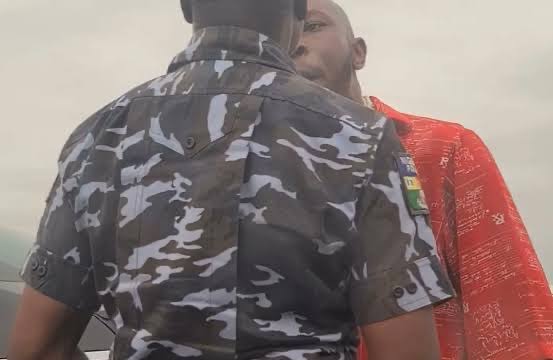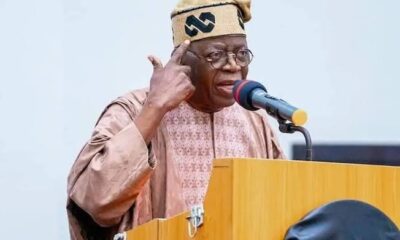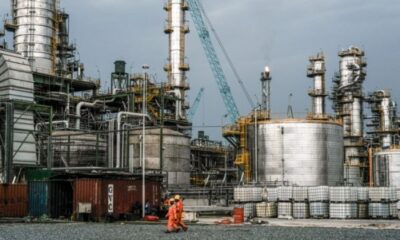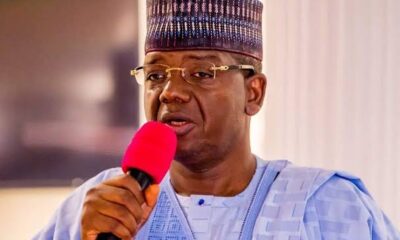Strictly Personal
Seun Kuti should have listened to his father, By Abimbola Adelakun
Published
2 years agoon

Fela Kuti’s 1976 album, Ikoyi Blindness, featured a track documenting an encounter within Nigerian social context where violence is trite. The song, Gba mi leti ki n dolowo (slap me make I get money), is an encounter between an “Oga,” the quintessential big man who personifies the impunity of power, and an unnamed person who represents the disempowered masses. In the song, Oga reaches out to slap the Unnamed’s face. Rather than quake before Oga’s almighty power, Unnamed stands up to him. He taunts Oga to hit him saying the “systems of government in Africa” would arise on his behalf and he would ultimately become rich. Oga, stumped by the unusual rebuff, freezes in mid-action.
Fela being the activist that he was, of course, spoke from the angle of the disempowered Nigerian. Yet, the exchange he described gave enough insight into the predicament of Oga petrified by the defiance of the Unnamed. For Oga who must have been used to dehumanising the poor with such gratuitous violence, this unexpected boldness denies him the assertion of his status of power he sought through the slap. Pulling back from landing that slap would diminish his might as an Oga who can do and undo. Yet, going ahead would be imprudent if the enactment of that violence on Unnamed truly has the potential to change his fortunes. Oga’s hand suspended in mid-air as he is forced to listen to Unnamed’s taunt of “gba mi leti ki n dolowo” captures an intriguing moment of power reconfiguration. What happens if the violence the powerful enacts on the powerless is miscalculated and does not dehumanise? What if it instead elevates the Unnamed to be social equals with the powerful?
If you have followed the news on Seun Kuti’s ongoing travails for assaulting a policeman, you would have understood why I am using his father’s wisdom to divine the oracle. Who could have imagined that nearly 50 years after Ikoyi Blindness, the “Oga” in the tale would be Fela’s own son while the voice of the powerless lustily challenging the powerful power abuser would be the Police—an institution that has relentlessly abused Nigerians? It is a strange inversion, but here we are, parsing the layers of irony woven into the unfortunate encounter of Seun and an unnamed policeman.
By now, virtually everyone who has seen the video of Seun accosting an officer, unaware he was being recorded. There might have been a legitimate provocation somewhere, but the recording only showed Seun confronting the police officer and eventually slapping his face very hard before being restrained by passersby. The slapped officer—wisely, or maybe out of sheer intimidation—never fought him back. The first time I saw that video I wondered what kind of èèdì spell they cast on Seun. In a world where anyone can use their mobile phone to capture other people’s most mundane expressions without sparing a thought for their privacy, why get into a public fight? There is no winning for the person who wears the known face in such a dirty exchange. So far, nobody knows the name of the officer; his photo or any identifying details have not even been shared. It is Seun, the famous face in that encounter, that has now become a reference point for assault on the police.
That slap was ugly, even for a society like Nigeria where virtually everyone is prone to casual violence in everyday life. Whatever that officer did, whatever trauma a uniformed police officer represented to Seun, the man was—and will always be—a living breathing human deserving of dignity. There is no justification for assaulting him. Fela’s Gba mi leti ki n dolowo wisely intoned a lesson for the powerful. When you are higher on the social elevation, restraining yourself from engagement with those on the lower rungs of the social ladder is not cowardice. No, you preserve yourself because you do not want your virtue to be so cheaply transferred from your body to a moral or social unequal.
Like “Oga” found out, engaging the one you thought was powerless and could be driven over can end up with you being sapped of your worth. In that moment when Oga’s hand was suspended mid-action, debating whether to slap or not, he was diminished either way. The person he proposed to slap to assert your “Oga-ism” has become richer for the experience. They might not get cash out of it, but they could get morally richer because Oga let down his social worth to get into roforofo with them.
Seun must have imagined that since many police officers are routinely abused by the very system that employed them, by the coterie of Nigerian big men that use them like slaves, they can be treated like animals. Well, given his present tribulations, he sure thought wrong. They will fight for their own, not because they believe in justice or are trying to assert the dignity of their officer—whom the police institution dehumanises in other ways—but because they have been handed a golden chance to extract value from the encounter at the expense of Seun (and other civilians).
You only need to consider how the Ogas at the Police headquarters have been spitting into the air and using their own faces to collect it to know that they have become richer at Seun’s expense. A whole Inspector General of the Police had to order his arrest! A case of assault that should be treated at the local police precinct has now become an opportunity for the police headquarters to extract some moral coins from Seun. Even the Police Service Commission waded into the matter as if such violence is not routine in Nigeria. Delta Police PRO Edafe Bright even swore Seun would “regret his actions.”
The way they are going about his prosecution makes you wonder when they became so efficient at addressing an assault. Even though Seun turned himself in at the police station, they still had to handcuff him and parade him to the public. Then they asked the court for a remand order to detain him for 21 days claiming that the assaulted policeman was in a coma at an undisclosed hospital. For the prosecutor to spin such cheap and unimaginative yarn, you know that this case has become an opportunity to make money from a slap. As if all that was not bad enough, they raided Seun’s house and seized his wife’s phone!
Make no mistake, the assaulted officer is the least of their concerns. They do not abhor violence against their officers; they just want to be the ones to do it. If the Police institution truly cared about its officers, they would have the least proven it by improving their material conditions. Seun handed them his derrière on a silver platter, unfortunately. He not only slapped an officer but had also previously made a video where he boasted that he had slapped police officers many times before because he was Fela’s son. That is a slight the police will not take lightly. With his own mouth, he nailed himself to their cross.
The top officers might not even bother with him, but you see the lowly ones who regularly endure ridicule in the hands of the Ogas they are regularly deployed to serve? They will humble him. His humiliation will validate their self-worth. They will not stop there. In the future, they will still use him to deflect accusations of police brutality. Slapping a police officer in Nigeria is a fantastic example of overreaching yourself and making your victim richer at your expense. Seun is a very good musician who plays his father’s music very well. Honestly, he should have listened to the songs too.
You may like
-


Nigeria: 614,937 killed, 2.2m abducted in 1 year— Report
-


Nigeria obtains $600 million international loans for agriculture
-


Nigeria’s November inflation rate hits 34.60%
-


‘I don’t take pleasure in causing you pains,’ Tinubu tells Nigerians amid hardship
-


Nigeria’s Dangote Refinery exports first fuel to Cameroon
-


Nigeria: President Tinubu’s reforms, economic policies yielding positive results— Minister
Strictly Personal
Let’s merge EAC and Igad, By Nuur Mohamud Sheekh
Published
3 weeks agoon
November 27, 2024
In an era of political and economic uncertainty, global crises and diminishing donor contributions, Africa’s regional economic communities (RECs) must reimagine their approach to regional integration.
The East African Community (EAC) and the Intergovernmental Authority on Development (Igad), two critical RECs in East Africa and the Horn of Africa have an unprecedented opportunity to join forces, leveraging their respective strengths to drive sustainable peace and development and advance regional economic integration and promote the African Continental Free Trade Area (AfCFTA).
Already, four of the eight Igad member states are also members of the EAC and, with Ethiopia and Sudan showing interest, the new unified bloc would be formidable.
Igad’s strength lies in regional peacemaking, preventive diplomacy, security, and resilience, especially in a region plagued by protracted conflicts, climate challenges, and humanitarian crises. The EAC, on the other hand, has made remarkable strides in economic integration, exemplified by its Customs Union, Common Market, and ongoing efforts toward a monetary union. Combining these comparative advantages would create a formidable entity capable of addressing complex challenges holistically.
Imagine a REC that pairs Igad’s conflict resolution strengths with the EAC’s diplomatic standing and robust economic framework. Member states of both are also contributing troops to peacekeeping missions. Such a fusion would streamline efforts to create a peaceful and economically prosperous region, addressing the root causes of instability while simultaneously promoting trade investment and regional cooperation.
These strengths will be harnessed to deal with inter-state tensions that we are currently witnessing, including between Ethiopia and Somalia over the Somaliland MoU, strained relations between Djibouti and Eritrea, and the continually deteriorating relations between Eritrea and Ethiopia.
The global economy experienced as a result of the COVID-19 pandemic, compounded by the Ukraine war and competing global crises, has strained donor countries and reduced financial contributions to multilateral organisations and African RECs. Member states, many of which are grappling with fiscal constraints, are increasingly unable to fill this gap, failing to make timely contributions, which is in turn affecting key mandate areas of Igad and EAC, and staff morale.
A merger between Igad and EAC would alleviate this financial pressure by eliminating redundancies. Shared administrative systems, integrated programmes, and a unified leadership structure would optimise resources, enabling the new REC to achieve more with less. Staff rationalisation, while sensitive, is a necessary step to ensure that limited funds are channelled toward impactful initiatives rather than duplicative overheads.
The African Union (AU) envisions a fully integrated Africa, with RECs serving as the building blocks of the AfCFTA. A unified EAC-Igad entity would become a powerhouse for regional integration, unlocking economies of scale and harmonising policies across a wider geographical and economic landscape.
This merger would enhance the implementation of the AfCFTA by creating a larger, more cohesive market that attracts investment, fosters innovation, and increases competitiveness. By aligning trade policies, infrastructure projects, and regulatory frameworks, the new REC could serve as a model for others, accelerating continental integration.
The road to integration is not without obstacles. Political will, divergent institutional mandates, and the complexity of harmonising systems pose significant challenges. However, these hurdles are surmountable through inclusive dialogue, strong leadership, and a phased approach to integration.
Member states must prioritise the long-term benefits of unity over short-term political considerations. Civil society, the private sector, the youth, and international partners also have a critical role to play in advocating for and supporting this transformative initiative.
The time for EAC and Igad to join forces is now. By merging into a single REC, they would pool their strengths, optimise resources, and position themselves as a driving force for regional and continental integration. In doing so, they would not only secure a prosperous future for their citizens and member states but also advance the broader vision of an integrated and thriving Africa.
As the world grapples with crises, Africa must look inward, embracing the power of unity to achieve its potential. A combined Igad-EAC is the bold step forward that the continent needs.
Nuur Mohamud Sheekh, a diplomatic and geopolitical analyst based in London, is a former spokesperson of the Igad Executive Secretary. X: @NuursViews
Strictly Personal
Budgets, budgeting and budget financing, By Sheriffdeen A. Tella, Ph.D.
Published
4 weeks agoon
November 20, 2024
The budget season is here again. It is an institutional and desirable annual ritual. Revenue collection and spending at the federal, State and local government levels must be authorised and guided by law. That is what budget is all about. A document containing the estimates of projected revenues from identified sources and the proposed expenditure for different sectors in the appropriate level of government. The last two weeks have seen the delivery of budget drafts to various Houses of Assembly and the promise that the federal government would present its draft budget to the National Assembly.
Do people still look forward to the budget presentation and the contents therein? I am not sure. Citizens have realised that these days, governments often spend money without reference to the approved budget. A governor can just wake up and direct that a police station be built in a location. With no allocation in the budget, the station will be completed in three months. The President can direct from his bathroom that 72 trailers of maize be distributed to the 36 states as palliatives. No budget provision, and no discussion by relevant committee or group.
We still operate with the military mentality. We operated too long under the military and of the five Presidents we have in this democracy, two of them were retired military Heads of State. Between them, they spent 16 years of 25 years of democratic governance. Hopefully, we are done with them physically but not mentally. Most present governors grew up largely under military regimes with the command system. That is why some see themselves as emperor and act accordingly. Their direct staff and commissioners are “Yes” men and women. There is need for disorientation.
The importance of budget in the art of governance cannot be overemphasized. It is one of the major functions of the legislature because without the consideration and authorisation of spending of funds by this arm of government, the executive has no power to start spending money. There is what we refer to as a budget cycle or stages. The budget drafting stage within the purview of the executive arm is the first stage and, followed by the authorisation stage where the legislature discusses, evaluates and tinkers with the draft for approval before presenting it to the President for his signature.
Thereafter, the budget enters the execution phase or cycle where programmes and projects are executed by the executive arm with the legislature carrying out oversight functions. Finally, we enter the auditing phase when the federal and State Auditors verify and report on the execution of the budgets. The report would normally be submitted to the Legislature. Many Auditor Generals have fallen victim at this stage for daring to query the executives on some aspects of the execution in their reports.
A new budget should contain the objectives and achievements of the preceding budget in the introduction as the foundation for the budget. More appropriately, a current budget derives its strength from a medium-term framework which also derives its strength from a national Development Plan or a State Plan. An approved National Plan does not exist currently, although the Plan launched by the Muhammadu Buhari administration is in the cooler. President Tinubu, who is acclaimed to be the architect of the Lagos State long-term Plan seems curiously, disillusioned with a national Plan.
Some States like Oyo and Kaduna, have long-term Plans that serve as the source of their annual budgets. Economists and policymakers see development plans as instruments of salvation for developing countries. Mike Obadan, the former Director General of the moribund Nigeria Centre for Economic and Management Administration, opined that a Plan in a developing country serves as an instrument to eradicate poverty, achieve high rates of economic growth and promote economic and social development.
The Nigerian development plans were on course until the adoption of the World Bank/IMF-inspired Structural Adjustment Programme in 1986 when the country and others that adopted the programme were forced to abandon such plan for short-term stabilisation policies in the name of a rolling plan. We have been rolling in the mud since that time. One is not surprised that the Tinubu administration is not looking at the Buhari Development Plan since the government is World Bank/IMF compliant. It was in the news last week that our President is an American asset and by extension, Nigeria’s policies must be defined by America which controls the Bretton Woods institutions.
A national Plan allows the citizens to monitor quantitatively, the projects and programmes being executed or to be executed by the government through the budgeting procedure. It is part of the definitive measures of transparency and accountability which most Nigerian governments do not cherish. So, you cannot pin your government down to anything.
Budgets these days hardly contain budget performance in terms of revenue, expenditure and other achievements like several schools, hospitals, small-scale enterprises, etc, that the government got involved in successfully and partially. These are the foundation for a new budget like items brought forward in accounting documents. The new budget should state the new reforms or transformations that would be taking place. Reforms like shifting from dominance of recurrent expenditure to capital expenditure; moving from the provision of basic needs programmes to industrialisation, and from reliance on foreign loans to dependence on domestic fund mobilisation for executing the budget.
That brings us to the issue of budget deficit and borrowing. When an economy is in recession, expansionary fiscal policy is recommended. That is, the government will need to spend more than it receives to pump prime the economy. If this is taken, Nigeria has always had a deficit budget, implying that we are always in economic recession. The fact is that even when we had a surplus in our balance of payment that made it possible to pay off our debts, we still had a deficit budget. We are so used to borrowing at the national level that stopping it will look like the collapse of the Nigerian state. The States have also followed the trend. Ordinarily, since States are largely dependent on the federal government for funds, they should promote balanced budget.
The States are like a schoolboy who depends on his parents for school fees and feeding allowance but goes about borrowing from classmates. Definitely, it is the parents that will surely pay the debt. The debt forgiveness mentality plays a major role in the process. Having enjoyed debt forgiveness in the past, the federal government is always in the credit market and does not caution the State governments in participating in the market. Our Presidents don’t feel ashamed when they are begging for debt forgiveness in international forum where issues on global development are being discussed. Not less than twice I have watched the countenance of some Presidents, even from Africa, while they looked at our president with disdain when issues of debt forgiveness for African countries was raised.
In most cases, the government, both at the federal and state cannot show the product of loans, except those lent by institutions like the World Bank or African Development Bank for specific projects which are monitored by the lending institutions. In other cases, the loans are stolen and transferred abroad while we are paying the loans. In some other cases, the loans are diverted to projects other than what the proposal stated. There was a case of loans obtained based on establishing an international car park in the border of the State but diverted to finance the election of a politician in the State. The politician eventually lost the election but the citizens of the State have to be taxed to pay the loan. Somebody as “Nigeria we hail thee”.
Transformation in budgeting should commence subsequently at the State and federal level. Now that local government will enjoy some financial autonomy and therefore budgeting process, they should be legally barred from contracting foreign loans. They have no business participating in the market. They should promote balanced budget where proposed expenditures must equal the expected revenues from federal and internal sources. The State government that cannot mobilise, from records, up to 40 percent of its total budget from IGR should not be supported to contract foreign loans. The States should engage in a balanced budget. The federal government budget should shift away from huge allocations to recurrent expenditure towards capital expenditure for capital formation and within the context of a welfarist state.
Sheriffdeen A. Tella, Ph.D.
EDITOR’S PICK


Ghana: President-elect Mahama appoints anti-corruption team
According to a statement released by his transition team on Wednesday, Ghana’s President-elect, John Dramani Mahama, has designated an anti-corruption...


Nigerian woman trafficked to Iraq cries out for help, begs to return home
A young Nigerian lady identified as Odunayo Eniola Isaac, who is a victim of human trafficking, has cried out for...


DR Congo sues tech giant Apple over illegal mineral exploitation
The Democratic Republic of Congo (DRC), has filed a criminal case against the European subsidiaries of tech giant, Apple, accusing...


UNESCO lists Ghana’s Kente cloth as cultural heritage
The iconic Ghanaian Kente, a piece of clothing, has been recognized as a cultural heritage on UNESCO’s Representative List of...


Zambia: FOX report highlights persistent media harassment, calls for reforms
A new Freedom of Expression (FOX) report by the Media Institute for Southern Africa (MISA) Zambia, has raised concerns over...


Egyptian court upholds ex-presidential candidate Ahmed Tantawy’s sentence
Former presidential candidate, Ahmed Tantawy, and his campaign manager, Mohamed Abou El-Diar, were found guilty of faking election paperwork, and...


Court orders Uganda to compensate LRA war crimes victims
Uganda’s tribunal has ordered the government to pay up to 10 million Ugandan shillings ($2,740) to each victim of Lord’s...


Nigeria: 614,937 killed, 2.2m abducted in 1 year— Report
A new report released on Tuesday by the National Bureau of Statistics (NBS) has revealed that over 614,937 Nigerians were...


Seeking to expand ties in Africa, Indonesia’s Prabowo attends D-8 economic meeting in Egypt
According to the government, Indonesian President, Prabowo Subianto, travelled to Egypt on Tuesday to attend meetings of the D-8 Organisation...


M23 Angola peace talks break down as Congo, Rwanda dash hopes
Hopes of an agreement to end Congo’s M23 rebel conflict, which has displaced over 1.9 million people, were dashed when...
Trending
-

 VenturesNow1 day ago
VenturesNow1 day agoNigeria’s November inflation rate hits 34.60%
-

 Politics1 day ago
Politics1 day agoM23 Angola peace talks break down as Congo, Rwanda dash hopes
-

 VenturesNow1 day ago
VenturesNow1 day agoIMF’s latest board reviews result in $182 million to Rwanda
-

 VenturesNow1 day ago
VenturesNow1 day agoNigeria obtains $600 million international loans for agriculture


